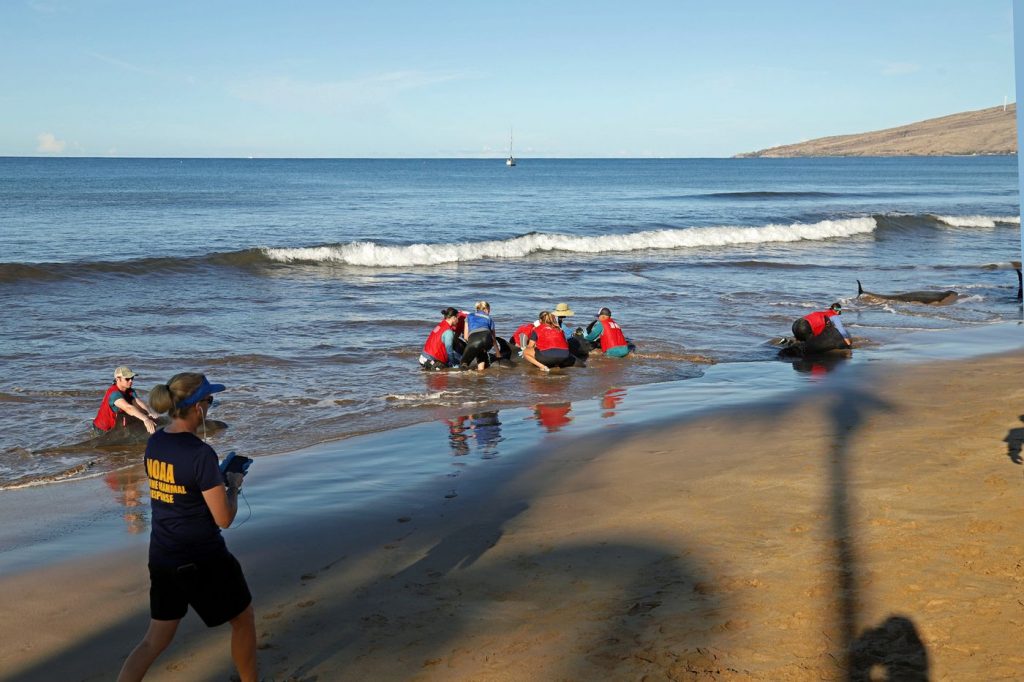
On August 29, there was a mass stranding of 10 melon-headed whales on Sugar Beach in Kihei. A group of the melon-headed whales were found in distress upon arrival. Following rescue attempts, four were euthanized and a dead calf was found nearby. Six of the whales were returned to the sea successfully.
There is a history of strandings for this species. In Hawaiʻi during 2004, a mass stranding occurred in Hanalei Bay off the coast of Kauaʻi. There were 150-200, reportedly, that entered the shallows of the bay, exhibiting unusual behavior. They were herded back out to sea. At this time, the Navy reported use of sonar 20 hours prior to the stranding. During 2008, three melon-headed whales that died at sea were discovered on a beach in South Carolina. Then in 2009, a mass stranding of over 300 whales happened in Bataan, Philippines. Two that were found had damaged ear drums. On Maui in August, as on Kauaʻi, they were, for the most part, successfully ferried out to deeper waters.

The melon-headed whale, Peponocephala electra, was first identified in Hawaiʻi off the coast of Hilo on Hawaiʻi Island’s eastern side in 1841. As the name indicates, the front of the head is rounded which gives it a melon-shape. These marine mammals, which are actually members of the dolphin family, grow to nine feet and weigh over 200 pounds, use echolocation, are gray in color except for darker hues around their face.
Melon-headed whales are not usually seen by many because the majority of their time is spent in the deep ocean far from shore. Social animals by nature, they travel in groups of over 1,000 and play, rest, hunt and socialize together. They’ve been known to follow boats to catch waves off the wake. Their dorsal fin has a pointed tip which helps with identification. As one of the many special creatures in the Pacific ocean that cradles our beautiful islands, they are beloved by many.
There’s been no conclusive evidence why this atypical behavior happens although some hypothesize sonar may be the cause. Low frequency sonar (LFA) is the loudest sound known to be put in the ocean. It’s an unnatural sound in the sea. At over 240 dB it’s been introduced, by the Navy, despite being documented as surpassing verified pain levels in some marine mammal. Echolocation, a primary navigation tool of many marine mammals, when distorted may cause loss of direction, shatter eardrums and create unusual behavior.
The standing of the melon-headed whales should be investigated through further research, community outreach, education, and dialogue, solutions in order to protect the lives of the ocean, which sustains our lives in many ways.
For additional information, check out:
Marine Mammalshttps://www.scientificamerican.com/article/does-military-sonar-kill/
Comments (2)
-
Talk about speculation – did you even ask the Navy if they were using sonar at any time near the strandings? low frequency sonar is not something that the ships at Hawaii use – they use mid-frequency sonar. Low frequency is used far out in the ocean.
Do some research before putting in unsupported hypothesis.
-
Aloha Frank,
mahalo for your comment. For clarification It was not written that the Navy was using LFS during the melon headed whale stranding in Hawai’i.
Although, I see how that assumption could be made as I didn’t distinguish that the information about LFS was not written in conjunction to the event in Kauai.
It was written to present information about LFSonar itself. In regards to the event in Kaua’i here is a source:
https://www.sciencedaily.com/releases/2006/04/060428094046.htm
Again, your comments are appreciated.
(Comment by Heather Poole)Sarah Gudmunson, Editor
-
